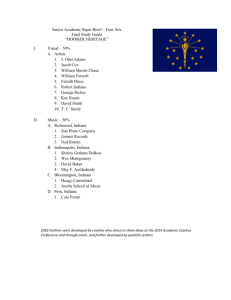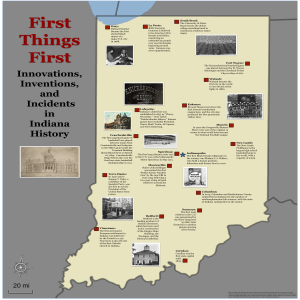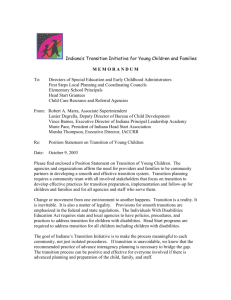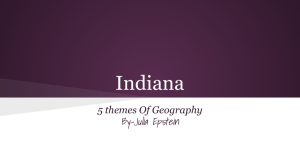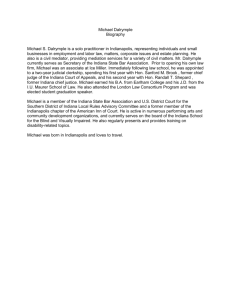Clio T N
advertisement
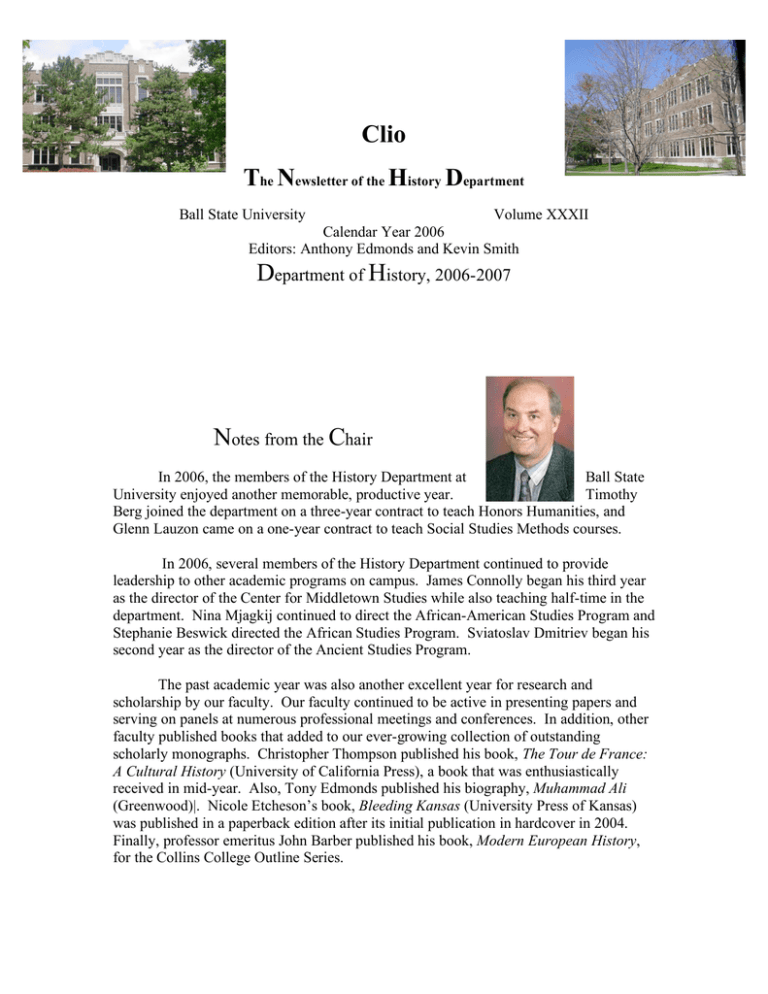
Clio
The Newsletter of the History Department
Ball State University
Volume XXXII
Calendar Year 2006
Editors: Anthony Edmonds and Kevin Smith
Department of History, 2006-2007
Notes from the Chair
In 2006, the members of the History Department at
Ball State
University enjoyed another memorable, productive year.
Timothy
Berg joined the department on a three-year contract to teach Honors Humanities, and
Glenn Lauzon came on a one-year contract to teach Social Studies Methods courses.
In 2006, several members of the History Department continued to provide
leadership to other academic programs on campus. James Connolly began his third year
as the director of the Center for Middletown Studies while also teaching half-time in the
department. Nina Mjagkij continued to direct the African-American Studies Program and
Stephanie Beswick directed the African Studies Program. Sviatoslav Dmitriev began his
second year as the director of the Ancient Studies Program.
The past academic year was also another excellent year for research and
scholarship by our faculty. Our faculty continued to be active in presenting papers and
serving on panels at numerous professional meetings and conferences. In addition, other
faculty published books that added to our ever-growing collection of outstanding
scholarly monographs. Christopher Thompson published his book, The Tour de France:
A Cultural History (University of California Press), a book that was enthusiastically
received in mid-year. Also, Tony Edmonds published his biography, Muhammad Ali
(Greenwood)|. Nicole Etcheson’s book, Bleeding Kansas (University Press of Kansas)
was published in a paperback edition after its initial publication in hardcover in 2004.
Finally, professor emeritus John Barber published his book, Modern European History,
for the Collins College Outline Series.
In another important field of scholarship, John Glen became the editor of the
International Journal of Social Education (IJSE). Under John’s editorship, the IJSE
continues to serve as a major publication for scholarship in the various areas of the social
studies, both in the United States and abroad.
Several members of our faculty also received prestigious external grants in 2006.
Gregory Witkowski, our specialist in German history, received a year-long Fulbright
fellowship to conduct research in Germany. Kenneth Swope, our specialist in Asian
history, received a summer stipend from the National Endowment for the Humanities.
Michael Doyle received a three-year grant from the Minnetrista Cultural Foundation in
support of the History Department’s program in Public History.
A heads up for fall 2007: Kevin Smith will be appearing on camera on September 27,
2007, in a program about the U.S. Army’s 1st Division (The Big Red One) produced by
WIPB in coordination with Ken Burns’ new documentary about World War Two, “The
War,” which airs that week.
Finally, we should note that all of the programs for the History major: the
departmental option, the pre-graduate studies option, the Public History option, and the
Social Studies Teaching Major, all experienced numerical growth in 2006. After another
successful year in 2006, the History Department looks forward to continuing its work in
teaching, research, and service in the next academic year.
Current Members of the Department of History
Tenured and tenure-track members: Abel Alves, Charles Argo, Stephanie Beswick, Jim
Connolly, Ashley de Waal-Lucas, Sviatoslav Dmitriev, Michael Doyle, Tony Edmonds,
Nicole Etcheson, Bruce Geelhoed, John Glen, Ken Hall, Carolyn Malone, Nina Mjagkij,
Ron Morris, Kevin Smith, Scott Stephan, Fred Suppe, Kenneth Swope, Chris Thompson,
Gregory Witkowski, Sergei Zhuk, and Phyllis Zimmerman.
Full-time and part-time contract faculty: Tim Berg, Robert Hall, Glenn Lauzon, Richard
Neel, Scott Parkinson, David Ulbrich, and James Wilson.
The Department also employs other individuals to teach on-campus courses on a courseby-course basis. In 2006-2007, these individuals were John Barber Christina Coelho,
John Marsh, Charles McDonald, Ike Rice, David Siebenaler, Christy Wauzzinski, John
Weakland, Patricia Weir, and Rebecca Zepick.
Office staff members: Denise Hile, administrative coordinator (until October 2006);
Stephanie Lantz, secretary (became administrative coordinator in November 2006);
Marsha Andrews, service center secretary.
Note to Alumni
Please see http://www.bsu.edu/history/form/0,,--224,00.html to respond
to our alumni survey—and find out what your fellow alumni are doing
by clicking on “Alumni Directory” at the bottom of the screen!
Student History Conference, February 2006
Dr. Bruce Geelhoed, Chair, opens the 2006 Student History Conference
Student Laura Kibbe presents her teaching unit on the Mexican-American War at the
2006 Student History Conference
College of Sciences and Humanities Dean Michael Maggiotto addresses the 2006
Student History Conference
Professional News
Abel Alves published “Mead: A Study in Human Culture’s Interaction with the Natural
Environment and Other Animals” in ISLE: Interdisciplinary Studies in Literature and
Environment 13: 2 (Summer 2006): 151-166. He also developed, with Carol Blakney,
the poster “The Biohistory of Grain,” for the American Society for Environmental
History and Forest History Society Joint Meeting (St. Paul, MN: March 29- April 1,
2006).
He also wrote three book reviews: of Robert H. Jackson’s Missions and the Frontiers of
Spanish America (Scottsdale, AZ: Pentacle Press, 2005) in The American Historical
Review111:3 (June 2006): 787; of Peter Hanns Reill’s Vitalizing Nature in the
Enlightenment (Berkeley: U. of California Press, 2005) in ISLE: Interdisciplinary Studies
in Literature and Environment. 13:2 (Summer 2006): 259-260; and of Rafael Angel
Rodríguez Sánchez’s Introducción de la medicina moderna en España: una imagen de
nuestra renovación científica (1687-1727) desde la teoría de la ciencia de Thomas S.
Kuhn (Seville: Ediciones Alfar, 2005) in Isis 97:4 (December 2006): 754-755.
Alves, in conjunction with Freshman Connections, the Center for Media Design, the
Department of Computer Science and the College of Communication, Information and
Media, made arrangements for the lecture “Building a Synthetic World: Indiana’s Arden”
by Edward Castronova, author of Synthetic Worlds: The Business and Culture of Online
Games (University of Chicago, 2005). The lecture was held at Ball State University
(November 17, 2006). He also provided written interpretations of two etchings:
Credenza with Coffee Service by Johann Jacob Schübler (1689-1741) and Snack Bar by
Isabel Bishop (1902-1988) for “Foodways,” Reordering the Universe: Recent
Acquisitions, Ball State University Museum of Art, May 18-November 5, 2006. He gave
public lectures at the Muncie Community Center for Vital Aging, Fisher Institute for
Wellness and Gerontology on “The History of Valentine’s Day,” February 14, 2006, and
to the Ball State University History Club on “Common Themes in Latin American
Empires: Pre-Columbian and Spanish,” November 14, 2006.
Stephanie Beswick co-edited a special issue of a Northeast African Studies volume
entitled "Women in the Horn of Africa: Oral Histories, Migrations, and Military and Civil
Conflict." It includes her article, "If you leave your country you have no life: Rape,
Suicide, and Violence: The Voices of Ethiopian, Somali, and Sudanese Female Refugees
in Kenyan Refugee Camps." Vol. 8, No 3 (2006): 69-98. {?}She also presented a paper,
"The Rise, Collaboration, and Fall of the Shilluk and Bari Kingdoms in the NineteenthCentury Slaving Era of South Sudan," at the 25th Anniversary of the Sudan Studies
Association Conference, held at Rhode Island College, Rhode Island, August 8-10,
2006. Her review of Gerard Prunier's Darfur: The Ambiguous Genocide (Ithaca, NY:
Cornell University Press, 2005) appeared in the June, 2006 issue of the American
Historical Review.
James Connolly continued to direct the Center for Middletown Studies and to pursue
research and publication on American urban, political, and ethnic history. He published
“Immigration and Ethnic Politics” in Reed Ueda, ed., Companion to American
Immigration (Oxford: Blackwell Publishers, 2006), 58-76 and “James Michael Curley,”
Encyclopedia of American Urban History. Thousand Oaks, CA: Sage Publications
(2006). He also published a review article entitled “The Problem of ‘The People’ in
Progressivism,” which examined Shelton Stromquist’s, Reinventing “The People:” The
Progressive Movement, the Class Problem, and the Origins of Modern Liberalism
(Urbana, Illinois, 2006) for The Journal of the Gilded Age and Progressive Era and a
short review of Daniel Eli Burnstein, Next to Godliness: Confronting Dirt and Despair in
Progressive Era New York City (Urbana, Illinois, 2004) for the Journal of American
History. He continues to work on his book project, “Democratic Visions: The Urban
Political Imagination in Industrializing America,” which is under advance contract with
Cornell University Press.
Connolly is also engaged in several other projects. He is co-principal investigator with
Frank Felsenstein of the “What Middletown Read” project, which entails the creation of
an online database documenting reader behavior in Muncie, Indiana (“Middletown”)
based on a near-complete set of records in the Muncie Public Library between 1892 and
1902. He worked with Ken Hall to prepare the “Small Cities in Global Context”
conference, which was held in April 2007. He also completed the “Organized Labor in
Muncie: An Oral History,” a project funded by the Community Foundation of Muncie
and Delaware County. He delivered two lectures on the labor history project, to the
Solidarity Labor Organization of Muncie and to the Friends of the Bracken Library. He
also gave a public talk on “Middletown Studies in the Digital Age” to the Ball State
Museum of Art. Connolly also served as manuscript reviewer for the University Press of
New England and the Journal of American History, as a member of the Editorial Board
of the Indiana Magazine of History, and as a consultant for both the “Ohio River
Teaching American History Project,” 2006-2007 and the “The Other Middletown” oral
history project, funded by a $25,000 Indiana Digital Library Digitization Grant.
Sviatoslav Dmitriev published an article, "Cappadocian dynastic rearrangements on
the eve of the first Mithridatic war," in Historia. Zeitschrift für Alte Geschichte 55.3
(2006): 285-297 and a review of Brian M. Lavelle, Fame, Money, and Power. The Rise of
Peisistratos and "Democratic" Tyranny at Athens (Ann Arbor: The University of
Michigan Press, 2005) in American Historical Review 111.2 (2006): 540-541. He also
served as reviewer of manuscripts submitted for publication to Oxford University Press;
Greek, Roman and Byzantine Studies; and Hesperia. As the current Director of Ancient
Studies program, he developed several new courses in ancient history ("Archaic and
Classical Greece: from Agamemnon to Alexander the Great"; "The Hellenistic
Mediterranean: from Alexander the Great to Caesar and Cleopatra"; "The Roman
Republic: from Brutus to Brutus"; and "The Roman Empire: from Julius Caesar to
Constantine the Great"), which he will be teaching in future semesters. He also
continued working on his second book, provisionally entitled The Slogan of Greek
Freedom and Early Roman Politics inn Greece.
Michael Doyle started his tenth year as director of the Department’s Public
History Internship Program (PHIP). He supervised several senior students in paid
internships at the Academy of Model Aeronautics’ National Model Aviation Museum
(NMAM) in Muncie. Through a special initiative proposed by him in January 2006, the
NMAM began offering interns from our Program up to three $500 stipends per semester.
During the spring, Sarah Eller did a 12 credit-hour internship as a curatorial assistant
accessioning artifacts and designing and fabricating a small exhibit for the Museum’s
gallery. Stacia Hool interned during the First Summer session as a cataloguer in the
archives. He also helped History major (Option 1) Kevin Mealy obtain a paid non-credit
internship in the NMAM’s collections department the summer semester. Finally, Tamara
Hamilton interned in the archives during the fall semester. She also designed and
fabricated a small exhibit for the Museum’s gallery.
During the summer he secured a new formal partnership with Minnetrista, where
dozens of our public history students have interned over the past couple of decades. In
exchange for modest funding ($2,500 per year), this three-year pilot project allows us to
offer limited 3 credit-hour internships to qualified non-Option 2 History majors and
Social Studies Teaching majors whose primary concentration is in History. Since our
program was established in 1987-88, the only way a student has been able to undertake
an internship for academic credit was by being enrolled in the public history major. With
the University encouraging all undergraduates to complete at least one formal immersive
learning experience during their tenure here, we will now be able to test the viability of
expanding internship opportunities through this premier regional museum. Minnetrista’s
financial support provides him as Program Director with an annual course buy-out for
recruiting, training, and supervising this new cadre of interns to help accomplish its
mission of collecting, conserving, and interpreting the natural and cultural heritage of
east-central Indiana.
A number of students in the Public History Program found Employment or were
Admitted to graduate school during 2006::
Lesley Coffin (B.S. summa cum laude with Honors, 2006) accepted a position with
WTTW Digital Archives at Chicago’s premier Public Broadcasting System affiliate.
Nick Speth (B.S. cum laude, 2005) was admitted into the Museum Studies graduate
program at IUPUI for the fall.
Marianne Sheline (B.A., 2006) in May was hired by the Indiana Historical Society as
administrative assistant for public programs. In the fall she earned a promotion by being
appointed coordinator for volunteer services.
Alex Lindeman (B.A., 2005) was hired in Spring as a seasonal interpreter at Denali
National Park in Talkeetna, Alaska.
Laife Janovyak (B.S., 2006) was accepted into the Peace Corps in June and began
training for her assignment to the Republic of Georgia.
Justin Sochacki (B.A., 2000) was hired in the fall as park ranger/interpreter at Death
Valley National Park (Cal.).
Michael also served on the board of advisors for BSU’s Center for Middletown
Studies.
On 7 February Michael gave two ninety-minute lectures to social studies teachers in
Madison, Indiana as part of Prof. Ron Morris’s half-million dollar grant from the U.S.
Department of Education for the Ohio River Teaching American History Project. His
lectures were entitled “‘Who's Your Daddy?’: The Origin and Meaning of the Word
‘'Hoosier’” and “Peopling Indiana: A Cultural Geography of the Hoosier State’s
Settlement Patterns.” He returned to Madison on 11 August 2006 to deliver a three-hour
lecture on “American Communal Utopias of the 19th Century.” On 24 February, he
served as chair and commentator for a session on “Public History – Canadian Style” at
the Department’s 9th annual Student History Conference. On 25 March, he delivered a
keynote address entitled “Conviviality and Perspicacity: Prospects for Research on
Sixties Communitarianism” at the conference “West of Eden: Communes and Utopia in
Northern California” co-sponsored by the University of California, Berkeley’s
Department of Geography and the Institute of International Studies.
On 20 July, he presented a two-hour workshop on “Oral History Methods” to
participants in the Muncie Roman Catholic Church Oral History Project, which was cosponsored by the Bracken Library Archives and Special Collections Department and the
Center for Middletown Studies and funded in part by a Library Services and Technology
Act grant from the Indiana State Library. On 17 November, he gave a day-long
workshop, “Talkin’ About a Revolution’: The Counterculture of America in the 1960s,”
at Ottawa Hills High School in Toledo, Ohio, in which he led a group of 14 students
through an exercise that involved a close reading of the Port Huron Statement (issued in
1962 by what would become the premier New Left organization, the Students for a
Democratic Society). They then produced its contemporary equivalent -- a collectively
authored manifesto that speaks for their generation about the leading issues and crisis of
the world today. At the end of the day, they offered the result in a novel idiom, a tenminute spoken word ensemble performance in the school auditorium before the student
body.
Tony Edmonds’ Muhammad Ali was published in January 2006 as a part of
Greenwood Press's Biography Series. Along with James Ruebel (Dean of the Honors
College) and Joanne Edmonds (Associate Dean of the Honors College), he gave a
presentation at the annual Regional Honors Faculty Development Honors Seminar at the
University of Cincinnati on February 9. The title of their session was "Four Models for
Integrated Freshman Honors Classes." He also wrote over 300 captions and sidebars for
The Fifties Chronicle, published in February by Legacy Press. In March, Tony was an
invited participant and co-presenter with Bruce Geelhoed at “The United States and Great
Britain: The Legacy of Churchill’s Atlantic Alliance,” an international conference held at
the Howard Baker Center for Public Policy, University of Tennessee, Knoxville, March
2006. They gave a paper, “Prime Minister Macmillan and President Eisenhower,” which
was broadcast on CSPN in December 2006. Along with his student, Allison Garrels, Tony
received a $2,500 literacy grant from Phi Kappa Phi National Honorary in April. The
money was used to buy books and supplies for Motivate Our Minds, a local not-for-profit
tutoring and enrichment center for children in grades 1-8. The books were distributed by
Ball State PKP members during the fall semester. Alpha Omicron Pi Sorority gave Tony
an award for his "commitment to outstanding teaching" in 2005-2006. He was granted a
special assigned leave for research in fall 2006. He spent part of the semester as a
Visiting Research Fellow at the Rothermere American Institute, Oxford, UK, where he
gave a paper on “Anti Vietnam War Demonstrations and Britain in 1968.” He also
received a 230 pound travel grant from the Institute to defray expenses incurred during
archival research in Cambridge, London, Hull, and Oxford. While in the UK, Tony gave
a paper on "Iris Murdoch, Tim O'Brien, and the Vietnam War" at the biennial conference
of the Iris Murdoch Society, September 15-16 in London. Tony and Joanne Edmonds
made a joint presentation on "Anthony Powell's Americans" at the annual general
meeting of the Anthony Powell Society on October 28 in London. His essay, “Joe
Louis,” appeared in Out of the Shadows: A Biographical History of the African American
Athlete, ed. by David Wiggins (Fayetteville: University of Arkansas Press, 2006). Finally,
he served as a referee, for George D. Moss, America in the Twentieth Century, Pearson,
2006.
Nicole Etcheson continued work on a book project tentatively titled “The Union
Homefront: Putnam County, Indiana in the Civil War Era.” She published “James H.
Lane: Radical Conservative, Conservative Radical,” in John Brown to Bob Dole: Movers
and Shakers in Kansas History, ed. by Virgil W. Dean, and a pedagogy supplement for
her 2005 article, “The Origins of the Civil War,” with History Compass, an on-line
journal. She was the invited speaker on “Bleeding Kansas and American Liberty” at the
Kansas City (Missouri) Public Library and for the Blue and Gray Education Society’s
Sesquicentennial Celebration in Kansas City, Missouri. She made presentations at
teachers institutes in summer 2006 for the Lincoln Institute for Teachers held by the
University of Southern Indiana and at the Kansas State Historical Society’s summer
institute for teachers. She commented on panel sessions at the Indiana Association of
Historians Annual Meeting and the Organization of American Historians Regional
Meeting.
Bruce Geelhoed completed his second year as chair of the History Department in
2006. In March, along with Tony Edmonds, he presented "Prime Minister Macmillan
and President Eisenhower" at a major conference, "The United States and Great Britain:
The Legacy of Churchill's Atlantic Alliance," sponsored by the Howard Baker Center at
the University of Tennessee. Bruce's article, "Rainbow Soldier: Vernon Kniptash and
World War I," appeared in the spring issue of Traces. He also received two external
grants from Maxon Corporation to update its corporate history.
John M. Glen has become editor of the International Journal of Social Education.
During 2006 he published "Myles Horton and the Highlander Idea: A Different Kind of
Education" in Tennessee: State of the Nation, 5th ed. (Belmont, CA: Thomson, 2006),
227-35. He also reviewed Dale Jacobs, ed., The Myles Horton Reader: Education for
Social Change (2003), for the History of Education Quarterly 46 (Spring 2006): 14749. He remains General Editor of the Indiana Archives series in the Indiana Magazine of
History, a member of the Executive Committee of the Indiana Association of Historians,
an Examination Leader for the Advanced Placement U.S. History Program, and a
member of Ball State's Task Force on Teacher Education Reform. Meanwhile, he
continues to work on his studies of the War on Poverty in Appalachia and the history of
Indiana since 1945.
Ken Hall edited and co-authored Maritime Diaspora in the Indian Ocean and East and
Southeast Asia (960-1775). Leiden: E. J. Brill, 2006, which includes his study “MultiDimensional Networking: Fifteenth-Century Indian Ocean Maritime Diaspora in
Southeast Asian Perspective.” He was ghost editor, provided an update of, and authored
New Southeast Asia sections for Rhoads Murphey, A History of Asia, 5th Edition,
Longman: 2006. He continues as Associate Editor of the Journal of the Economic and
Social History of the Orient and presented a paper titled “Sojourning Communities,
Ports-of-Trade, and Agrarian-Based Societies in Southeast Asia’s Eastern Regions,
1000-1300” at the International Economic History Association tri-annual conference in
Helsinki, Finland.
Nina Mjagkij published “Young Men’s Christian Association,” in Steven A. Reich
(ed.), Encyclopedia of the Great Black Migration (Westport, CT: Greenwood Press,
2006). She presented “The History of the African American YMCA in the United
States,” as an invited celebrity speaker at the YMCA’s General Assembly, Nashville,
Tennessee, July 27, 2006. She served as a panel chair for "Public Fronts: Black
Entertainers, GIs and 20th Century American Wars," at the Annual Meeting of the Social
Science History Association, Minneapolis, November 3-5, 2006. She reviewed
manuscripts for Brandywine Press, the Winterthur Portfolio, The Journal of the Gilded
Age and Progressive Era, and the Iowa Annals. In addition, she continues her work as a
member of the Editorial Board of The Journal of the Gilded Age and Progressive Era and
as co-editor of Rowman & Littlefield’s African American History Book Series. In 2006,
she was selected for inclusion in Who’s Who of American Women.
Ronald V. Morris led the Ohio River Teaching American History Project. He wrote
two articles, “The Land of Hope: Third Grade Students Use a Walking Tour to Explore
Their Community” in The Social Studies, and “Hitchcock v. Shaker Chairs: Artifacts to
Teach about the Rise and Rejection of Industrialism in the Young Republic” in Gifted
Child Today.
Kevin Smith concluded his series of six broadcasts in the ongoing “Bridging the
American Experiment” project cooperatively undertaken by the Indiana Academy for
Science, Mathematics, and Humanities and the Ball State History Department, 20032006. The project brought together rural high school history teachers with professional
historians from the Indiana Academy and the BSU History Department to provide
additional training that will “ensure that teachers develop the knowledge and skills
necessary to teach traditional American history in an exciting and engaging way” via case
studies in Indiana history as American history. During 2006, he delivered two 2! hour
distance education broadcasts: “Redefining and Implementing Containment in the Second
Cold War, 1953-1980,” mentioning opposition to Vietnam and support for the Panama
Canal Treaty from such Hoosiers as Senator Birch Bayh and Vance Hartke and Rep.
Andy Jacobs, Jr., and “American Foreign Policy, 1980-2001,” emphasizing Senator
Richard Lugar’s role in the 1980s transfer of power in the Philippines and his efforts to
contain nuclear proliferation as well as America’s changing relationship with the Middle
East before 9-11. In summer 2006, he began offering the U.S. History since 1877 summer
session course over Internet video (http://www.bsu.edu/distance/uginternet/). He also
participated in another TAH grant (coordinated by Professor Ron Morris) in August
2006, presenting for 10 hours over 3 days on “Diplomatic History and the Shadow of
War across the Atlantic and the Pacific” to social studies teachers in the Madison, IN
area, emphasizing among other tools the use of Dr. Seuss cartoons in teaching about the
World War Two era. He will begin participation in a new TAH grant coordination by the
Indiana Academy targeting middle school social studies teachers, “Building a Nation,” in
March 2007 with a broadcast on foreign policy in the early national period, 1783-1796.
This integration of his teaching duties in the history of U.S. foreign relations and service
outreach to teachers dovetails with his research interests. He has begun research on his
second book, “Hoosier Statesmen,” which will explore the role prominent residents of
Indiana have played in shaping U.S. foreign relations. In May 2006, he became Acting
Director of Social Studies Education. He concluded his 5 ! years as Assistant Chair of
the Department of History on January 2, 2007 and his two-year stint on the University
Strategic Planning Task Force in December 2006.
Frederick Suppe was elected to a two-year term as Vice President of the Celtic
Studies Association of North America, to be followed by a two-year term as president of
this international scholarly organization. He organized two sessions of papers on behalf
of CSANA for presentation at the International Congress of Medieval Studies at
Kalamazoo, Michigan in May and presided over one of these sessions. He continues to
serve as the elected treasurer for the Charles Homer Haskins Society, an international
organization of medieval historians. In October he gave the plenary address on “AngloWelsh Relations during the Twelfth Century: The Role of Interpreter Families” to the
Midwest Medieval History Conference held at the University of Evansville. He
submitted a commissioned entry on “Warfare in Medieval Ireland and Wales” for the
Oxford Dictionary of the Middle Ages and he was commissioned to prepare fourteen
entries for Early Peoples of Britain and Ireland: An Encyclopedia. He continues to
serve as an external member of the doctoral committee for a doctoral candidate in Celtic
Studies at Harvard University, Laura Radiker. He also served the History Department as
their representative on the University Senate and on the Faculty Council. He was elected
to serve as parliamentarian for the latter body.
Kenneth Swope ran an introductory training session for museum docents last fall and
wrote captions for pieces on special display for the museum’s Food Ways exhibit last
summer-fall. At the national level, he finished his term as a Board Member of the
Society for Ming Studies and continued to serve as a Board Member of the Chinese
Military History Society. He also arranged for the Ball State history department added to
the Society for Military History’s website list of graduate programs and served as BSU’s
liaison/contact with the SMH.
Ken received an NEH grant for his current book project, A Dragon’s Head & a
Serpent’s Tail: Ming China and the First Greater East Asian War, 1592-1600. He also
recently signed a contract with Routledge for his next monograph, The Military Collapse
of China’s Ming Dynasty, 1620-1644. In addition, Ken received a Moncado Prize from
the Society for Military History (January 2006) for an article published in 2005. He also
published “Beyond Turtleboats: Siege Accounts from Toyotomi Hideyoshi’s Second
Invasion of Korea, 1597-1598,” Sungkyun Journal of East Asian Studies 6.2 (October
2006), pp. 177-206.
Ken also made a number of presentations in 2006, including a guest lecture entitled
“Baywatch: Anti-Japanese Coastal Defenses in Late Sixteenth-Century China” at the
University of Toronto, Toronto, Canada, December 2006; a paper entitled “Protecting the
Dragon’s Teeth: Reasons for Ming China’s Intervention” for the conference: “A
Transnational History of the Imjin Waeran: The East Asian Dimension,” Tongyong,
South Korea, June 2006; a paper entitled “All Along the Watchtowers: Plans for
Bolstering Coastal Defenses in Late Sixteenth-century China” for the panel “Raiders,
Traders and Invaders in Premodern Northeast Asia” at the Annual Meeting of the Society
for Military History at Kansas State University, Manhattan, KS, May 2006; a paper
entitled "The Beating of Drums & Clashing of Symbols: Music in Late Ming Military
Operations" for the “Musiking the Late Ming” Conference at the University of Michigan,
Ann Arbor, MI, May 2006 ; a paper entitled “Father Knows Best? Emperor Wanli and
the Ming Intervention” as part of the panel “The Korean War of 1592-98 and Styles of
Governance in Premodern East Asia” at the Annual Meeting of the Association for Asian
Studies, San Francisco, CA, April 2006; a presentation entitled “Using Korean Archives
for Ming History” at the Annual Meeting of the Association for Ming Studies, San
Francisco, CA, April 2006.
Finally, Ken organized panel entitled “Raiders, Traders and Invaders in Premodern
Northeast Asia” for the Annual Meeting of the Society for Military History held at
Kansas State University, Manhattan, KS, May 2006.
Christopher Thompson continued as Director of the MA Program in History and
was named Director of the MA Program in Social Science Education. He published The
Tour de France: A Cultural History with the University of California Press in June
2006. The book has been reviewed very favorably in The Wall Street Journal and the
Indianapolis Star, as well as by academic reviewers for H-German and H-France, the
listservs for historians of Germany and France respectively. During the summer
Professor Thompson was interviewed by the Chronicle of Higher Education about his
book in a July issue, by the BBC Radio Show "Thinking Allowed," as well as by the Los
Angeles Times during the 2006 Tour and in the wake of the problems involving American
cyclist Floyd Landis. Professor Thompson also delivered a public lecture in London in
July at the California House and two public lectures in New York City in September; the
latter were organized by the French-American Foundation and the Alliance Francaise and
by New York University's Maison Francaise.
Gregory Witkowski is spending the academic year 2006-2007 on a research leave in
Germany. He received a Fulbright Faculty Research Grant for his project “Campaigning
for Change: East German Charity and Philanthropy, 1959-89.” He was also supported by
a Fulbright Commission/German Historical Institute/Ball State University Summer
Salary grant.
Greg also made several conference presentations, including: "GDR: A Retropsective"
Fulbright Capital Program, Berlin, December 2006; “Local Loyalties: Mecklenburg
Mentalities and Communist Policies in East Germany,” German Studies Association,
Pittsburgh, October 2006; “Images of Africa: East German Identity Formation and
African Charitable,” Black European Studies Conference, Free University Berlin,
Germany, July 2006; “Bearing Gifts: Communist East German Philanthropy and Charity,
1959-89,” Philanthropy in History: German and American Perspectives, German
Historical Institute, Washington DC, March 2006. He also served as a moderator for
“Germany, Europe, the World: Transnational, Multicultural, and Comparative
Approaches to Classroom Presentations of German History and Culture,” German
Studies Association, Pittsburgh, October 2006.
Greg’s publications include “Peasants’ Revolt? Reevaluating the 17 June Uprising in
East Germany,” German History, May 2006, and “Going to the Source: Reevaluating
State Power and Everyday Life in the East German Dictatorship,” The Many Faces of
Clio: Cross-cultural Approaches to Historiography, Q. Edward Wang and Franz Fillafer,
eds. (New York: Berghahn Books, 2006).
Sergei Zhuk continued his work on a project entitled as “Illusions of the West in the
`Closed City’: Cultural Consumption, Identities and Transgressions of Late Socialism in
Soviet Ukraine, 1964-1984." He spent summer of 2006 doing a research work in archives
of Ukraine and Russia for his new project. He presented a paper, “Rock and Rolling the
Soviet Rocket City: International Tourism, Ideology and Cultural Consumption in the
`Closed City’ of Soviet Ukraine: 1964 – 1984” at the Fourth Annual Conference of the
International Association for the History of Transport, Traffic & Mobility, Paris, Marnela-Ville, France, September 28 – October 1, 2006. He also organized a panel, “Building
National Identity through Cultural Consumption: The Youth of Soviet and Post-Soviet
Ukraine and Problems of Cultural Identification,” for the 38th National Convention of the
American Association for Advanced Slavic Studies, Washington, DC, November 16-19,
2006, where he presented a paper based on his new research, “Building the Ukrainian
Identity through Cultural Consumption in the `Closed’ City of Soviet Ukraine:
Dnipropetrovs’k KGB Files and `Transgressions’ of Everyday Life during Late
Socialism, 1959-1985.” Three essays written by Dr. Zhuk appeared in 2006:
“`A Separate Nation’ of ‘Those Who Imitate Germans’: Ukrainian Evangelical Peasants
and Problems of Cultural Identification in the Ukrainian Provinces of Late Imperial
Russia,” Ab Imperio, No. 3 (2006); “Ukrainian Evangelical Peasants as ‘Cultural
Pioneers’ of Late Imperial Russia,” Religion and Society in Central and Eastern Europe,
No. 1 (May 6); and “Radical Reformation in the Ukrainian Steppes: Cultural Dialogue of
the Mennonites and Shalaputs, the 1860s” Humanitarian Journal (Ukraine), No. 2
(Winter-Spring 2006) [in Russian].
David J. Ulbrich was in his third year serving as a contract faculty member in the
History Department and Correctional Education Program. He successfully defended his
dissertation, titled “Managing Marine Mobilization: Thomas Holcomb and the U.S.
Marine Corps, 1936-1943,”at Temple University in November 2006. In addition to
teaching on campus and in the prison program, Ulbrich authored the Introduction to
Chapter 7, “The Asymmetric Period, 1995-2004,” of the Handbook of American Military
History: From the Revolutionary War to the Present (University of Nebraska Press,
2006). Ulbrich also published “Revisiting Small Wars: A 1933 Questionnaire, Vernon E.
Megee, and the Small Wars Manual” in the Marine Corps Gazette (2006). He
contributed the entries, “U.S. Women in Military Service in World War II” and “Ruth C.
Streeter,” to Women and War: A Historical Encyclopedia from Antiquity to the Present
(ABC-Clio, 2006). Ulbrich presented his paper, “Challenges in Wartime Expansion:
Thomas Holcomb and the U.S. Marine Corps, December 1941 to July 1942,” at a Faculty
Seminar in the History Department in 2006. He chaired the U.S. Marine Corps Heritage
Foundation’s award selection committee which awarded three prizes for outstanding
articles on Marine Corps history published in 2006. Throughout the 2006-2007 academic
year, Ulbrich has worked as a historical consultant for “Echoes of War: Real Stories of
the Big Red One.” This documentary is being developed for WIPB in conjunction with
Ken Burns’ upcoming PBS series, The War, which will air in the fall of 2007. Ulbrich is
involved in all stages of production, including oral history interviewing, script writing,
and story board editing. “Echoes of War” is receiving support from WETA as well as
from the McCormick Foundation at Cantigny Park in Wheaton, Illinois. Most recently,
Ulbrich began teaching the course, “Race and Gender in Military History,” for Norwich
University’s online Masters of Arts in Military History program.
Phyllis Zimmerman gave a telephone interview to Brian Mitchell of Investors
Business Daily on Marine general David M. Shoup's life; her remarks appear in the
March 21, 2006 edition. Phyllis also gave a talk, "Cambodia: Then & Now," on
September 12 at DeHority Hall as part of Asian Culture Night.
